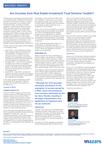Are Incomes from Real Estate Investment Trust Scheme Taxable?
The Securities and Exchange Commission (SEC) is the regulatory body overseeing the investment activities of a Real Estate Investment Company through the provisions of the Investment and Securities Act (ISA). According to the SEC guidelines, a Real Estate Investment Scheme (REIS) can either be set up as a Real Estate Investment Trust (REIT) or as a Real Estate Investment Company (REIC). Further, an entity operating under a REIS can wholly acquire and hold legal title to property or choose to hold equitable and beneficial title to such property through a deed of trust or such other structure that may be prescribed by the Commission. It may also hold such income-generating lands and buildings through a special purpose vehicle (SPV).
Primarily, there are three types of REITs available in the Nigerian market.
- Equity REITs – these companies purchase, hold, manage and finance commercial and rental properties. The primary source of revenue for this sort of REITs is through acquisition and management of the income-generating real estate. Equity REITs generate income principally from properties' rents.
- Mortgage REITs – invest in and own property mortgages, loan money for mortgages to owners of real estate and mostly lend money directly to real estate owners and operators. Revenue is earned largely by the interest on the mortgage loans.
- Hybrid REITs – these REITs combines the investment strategies of equities and mortgage REITs to build up their product. They invest in both properties and mortgages.
Taxation of REITs
Company Income Tax
Income of a REIT is typically a rental income, dividend income from other REITs, gains from disposal of assets, fees, and other income. However, exemptions are granted to dividend income earned by a Real Estate Investment Company (REIC) in accordance with section 23 of CITA provided that a minimum of 75% of such dividend or rental income is distributed within 12 months from the financial year end in which the dividend or rental income was earned.
On the other hand, any expenses incurred by a REIC in generating exempted income shall not be allowable for tax deduction. Also, any undistributed dividend or rental income beyond 12 months would be regarded as taxable income, therefore, expenses incurred to earn the rental and dividend income, as well as dividends paid by the REIC to its shareholders will be allowed for tax deductions.
Nevertheless, income earned by a REIC other than dividends or rental income, such as gains from disposal of assets, fees and other income would be taxed in accordance with the provisions of the relevant tax laws as there are no tax exemptions for such income.
Section 19(1) of CITA is the basis for the taxation of excess dividend and it provides the conditions upon which the dividends paid by a Nigerian company may be subjected to tax. However, Section 19(2) provides for the exemption of rental and dividend incomes distributed to shareholders of a real estate investment company from excess dividend tax.
Finally, dividends distributed by a REIC to its shareholders is an allowable deduction in accordance with the provisions of section 24(1)(k) of CITA. Hence, such distribution should be treated as a tax deductible.
Withholding Tax
Based on section 80 of CITA, withholding tax would not apply on any distribution or dividend payment made to a REIC operating in a REIS. Effectively, such income would not also constitute franked investment income. The WHT treatment would be different where the REIC is not under a REIS. In this case, the dividend payment to the REIC would be subject to WHT at the rate of 10%.
The exemption of WHT from dividend and rental income will only apply on payments to REICs. It does not apply when the REIC redistributes dividend and rental income to its shareholders. As a result, the WHT deducted would be the final tax on the dividend and rental income received by the shareholders.
Deferred Tax
Typically, REICs acquire and hold properties for investment purposes. These assets are usually capitalized in the books of the REIC based on the requirements of the International Financial Reporting Standards (IFRS). The entity may choose to recognize the investment property at cost or fair value.
According to the IFRS, specifically International Accounting Standards (IAS) 40, where the fair value of an investment property cannot be measured reliably; the cost model should be adopted for subsequent measurement of an investment property. Deferred tax for investment property carried at fair value should be measured using the tax base and rate that are consistent with recovery through sale. Hence, Deferred Capital Gains Tax (CGT) at 10% would apply if the investment property will be recovered through disposal.
Where the REIC chooses to adopt the cost model, it means the investment property would be recovered through use, hence would be depreciated annually over its expected useful life. Consequently, deferred tax would arise from the difference between carrying value and tax base of the investment property. Please note that deferred tax will be recognized at 30% since the investment property will be recovered through use and the manner of recovery is by way of depreciation.
Conclusion
Although the CITA provides necessary provisions for the exemption of income earned by a REIC, some circumstances have not been addressed by the tax laws, thereby resulting in divergent interpretation and application by taxpayers and the tax authority.
One of such is the treatment of capital allowance claimable on the income generating real estate properties since there are instances where a REIT may be liable to income tax. There is no specific provision in CITA that expressly states the treatment of capital allowance for a REIC. Also, there are no clear provisions on the exemption from Tertiary Education Tax (TET). However, considering that other income such as gains from disposal of assets, fees and other income would be subject to CIT, it can be inferred that these incomes would also be subjected to TET.

